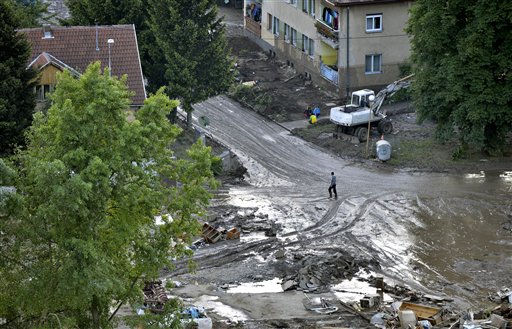Balkans floods trigger Bosnia’s worst exodus since war

A man walks through mud after devastating floods in the town of Maglaj 140 kilometers north of Sarajevo, Bosnia-Herzegovina, Monday May 19, 2014. At least 47 people have died in the Balkans in the five days of flooding caused by unprecedented torrential rain, laying waste to entire towns and villages and sending tens of thousands of people out of their homes, authorities said. AP PHOTO/SULEJMAN OMERBASIC
TRPCIC POLJE—Bosnia said Monday it was witnessing “the biggest exodus” since the 1990s war after the worst floods in a century inundated huge swathes of the Balkans, killing at least 47 people.
Muddy waters from the Sava River have submerged houses, churches, mosques and roads in Bosnia, Serbia and Croatia after record rainfall last week wreaked havoc across the region.
There were fears that dead bodies and animal carcasses could lead to disease outbreaks, while officials warned that 120,000 unexploded mines from the conflicts of the 1990s could be dislodged.
“More than 100,000 people” have been evacuated in Bosnia alone, said Stanko Sliskovic of Bosnia’s emergency services, with tens of thousands more displaced in neighboring countries.
“This is the biggest exodus since the end of the 1992-1995 war,” he told AFP.
Article continues after this advertisementDozens of towns and villages have been cut off and over 2,000 landslides already reported, with water levels expected to continue rising in the coming days.
Article continues after this advertisementIn Kosova, a hamlet between the northwestern Bosnian towns of Doboj and Maglaj which was badly hit by flooding, people’s homes were almost visibly moving as the loose terrain shifted.
Around 20 homes “have slid down 30 meters (yards) since yesterday. They will not exist tomorrow,” a rescue worker said.
Bosnian Foreign Minister Zlatko Lagumdzija said more than a quarter of the country’s population of 3.8 million “has been affected by the floods” after the heaviest rainfalls on record began last week.
“Right now, more than one million people have no water,” he said.
In Serbia, some 600,000 of its 7.2 million inhabitants were affected by “severe floods following the heaviest rains the Balkans have witnessed in 120 years,” the UN’s World Food Program said in a statement.
“This is Armageddon, I can’t describe it otherwise,” Nedeljko Brankovic told AFP from Krupanj, a town in the southwestern Serbia. “Houses are literally washed away and landslides are everywhere.”
The death toll from the floods rose to 47 Monday after two new victims were found overnight in a village near the western Serbian town of Sabac.
Neighboring Croatia has also evacuated thousands of people from along the river Sava.
‘I’ve lost everything again’
Rescuers told of wrenching scenes as they finally reached cut-off villages, with dozens of people huddling on top of the tallest houses with no water or food.
“It was like a tsunami,” said Suad Garanovic, resident of the Bosnian village of Topcic Polje, as he looked over his house, now drowned in mud.
“This is the second time I’ve fled my house. The first time was during the war. Now, just like then, I’ve lost everything,” said Nihad Smajlovic in a nearby hamlet.
Svetlana Obojcic described her rescue along with neighbors from the top floor of her building in the Serbian town of Obrenovac.
“All 30 of us were in one flat for three days without electricity,” said the mother-of-two, hugging her six-year old twins in a temporary shelter in the Belgrade suburb of Sumice.
“We ate what we had, we did not have enough water, but at least we are dry now,” she said.
More than half of Obrenovac’s population of 20,000 had already been evacuated by Friday and Interior Minister Nebojsa Stefanovic on Monday ordered the rest be brought to safety.
Health authorities have ordered inhabitants not to return to their homes until they would be cleared from the debris and safe from diseases.
“We have to react properly to avoid an even worse catastrophe, to avoid infectuous diseases,” Serbian Health Minister Zlatibor Loncar told state TV RTS.
Emergency teams were desperately trying to strengthen defenses at the nearby Nikola Tesla power plant, which produces around half of Serbia’s electricity and is currently only protected by temporary dikes built by thousands of volunteers along the swollen Sava River.
“I am devastated. I have left everything, my cattle, my pigs, my chickens. Thank God my wife, children and grandchildren are safe,” said 78-year old pensioner Veselin Rankovic from Zabrezje, a nearby village.
In Belgrade, thousands of volunteers were packing and lifting sandbags on the riverfronts of the Sava to secure the capital’s lower areas from flooding expected in the coming days.
Threat of mines
In a potentially deadly side-effect, officials in Bosnia warned on Monday that some 120,000 unexploded mines left over from the Balkan war of the 1990s could be dislodged and moved.
“Water and landslides have possibly moved some mines and taken away mine warning signs,” Sasa Obradovic, an official of Bosnia’s Mine Action Centre told AFP.
He warned residents to be “extremely cautious when they start cleaning their houses, land or gardens as the remaining mud could hide mines and other explosive devices brought by rivers.”—Rusmir Smajilhodzic